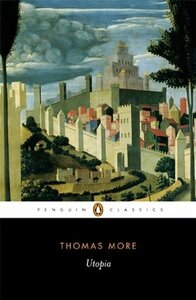Take a photo of a barcode or cover
I listen to a podcast called pitchfork economics. It basically makes the argument that the rich have been hoarding and distorting wealth for centuries by fabricating the narratives of wealth. Right now, their narrative is trickle down economics, but from “suffrage for women would be bad for women” to “freedom for slaves would be bad for slaves,” they’ve been playing the same trick with different narratives for centuries.
This book, written 500 years ago, is like a time capsule capturing the occurrence of the same theme in 1500s England. True to its time period, the story is of landed gentry accumulating wealth and producing very little value at the expense and exploitation of plow drivers. But the themes still hold. In this sense, the book was a valuable read, although it accomplished this in a cumulative 20-30 pages out of 130. The real power of the book is the snapshot it offers into the dynamics of class economics 500 years ago. They’re strikingly similar to our contemporary landscape.
The remainder of the book is obsolete and fraught with a painful blindness to the forces of colonialism. While this might be expected of a book published in 1516, it’s just so damn annoying to read. More’s imagined Utopia is proudly dependent on the labor of slaves and “natives,” who are tasked with the menial jobs of butchering and soldiering. These labors are considered too base for the souls of Utopia’s citizens, whose sensitivities and pathos might be corrupted should they be forced to slaughter the animals whose flesh they consume. Couple this with Utopia’s moral philosophy that the purpose of life is to feel pleasure, and therefore that the consumption of meat produced by slave labor is a near-divine expression of corporeal pleasure, and I just found myself constantly cringing.
These cringe-worthy examples abound in the book, and collectively they reveal that More’s conception of”Utopia” is riddled with the same cancerous class-dynamics that he critiques of English society. His blindness is in who he speaks for. While he can humanize the English working class, and therefore speaks for them, More is incapable of speaking from the perspective of Utopia’s slaves and mercenaries.
Any redeeming qualities of Utopian philosophy and society feel like a deus ex machina. From their collective altruism to their subtle manipulations in war, the Utopian solutions to the problems posed by More are contrived and detached from any context to explain their plausibility. While Raphael, More’s narrator, more or less admits this along the way, that self-awareness doesn’t salvage a ‘narrative’ which ultimately strikes this 21st century reader like a long, half-baked daydream.
I’d say, read this if you’re search for a sense of scale for how long the rich have been exploiting the poor. Read this if you think a 130 page book is short enough that it’s worth the risk.
But don’t read this if you’re looking for a thought provoking outlet for personal growth. There are many other, modern, and post-colonial books that would be a much better place to start.
This book, written 500 years ago, is like a time capsule capturing the occurrence of the same theme in 1500s England. True to its time period, the story is of landed gentry accumulating wealth and producing very little value at the expense and exploitation of plow drivers. But the themes still hold. In this sense, the book was a valuable read, although it accomplished this in a cumulative 20-30 pages out of 130. The real power of the book is the snapshot it offers into the dynamics of class economics 500 years ago. They’re strikingly similar to our contemporary landscape.
The remainder of the book is obsolete and fraught with a painful blindness to the forces of colonialism. While this might be expected of a book published in 1516, it’s just so damn annoying to read. More’s imagined Utopia is proudly dependent on the labor of slaves and “natives,” who are tasked with the menial jobs of butchering and soldiering. These labors are considered too base for the souls of Utopia’s citizens, whose sensitivities and pathos might be corrupted should they be forced to slaughter the animals whose flesh they consume. Couple this with Utopia’s moral philosophy that the purpose of life is to feel pleasure, and therefore that the consumption of meat produced by slave labor is a near-divine expression of corporeal pleasure, and I just found myself constantly cringing.
These cringe-worthy examples abound in the book, and collectively they reveal that More’s conception of”Utopia” is riddled with the same cancerous class-dynamics that he critiques of English society. His blindness is in who he speaks for. While he can humanize the English working class, and therefore speaks for them, More is incapable of speaking from the perspective of Utopia’s slaves and mercenaries.
Any redeeming qualities of Utopian philosophy and society feel like a deus ex machina. From their collective altruism to their subtle manipulations in war, the Utopian solutions to the problems posed by More are contrived and detached from any context to explain their plausibility. While Raphael, More’s narrator, more or less admits this along the way, that self-awareness doesn’t salvage a ‘narrative’ which ultimately strikes this 21st century reader like a long, half-baked daydream.
I’d say, read this if you’re search for a sense of scale for how long the rich have been exploiting the poor. Read this if you think a 130 page book is short enough that it’s worth the risk.
But don’t read this if you’re looking for a thought provoking outlet for personal growth. There are many other, modern, and post-colonial books that would be a much better place to start.
Despite a couple of More's more, uh, 16th century ideas, Utopia is still surprisingly relevant and applicable today.
inspiring
reflective
slow-paced
Plot or Character Driven:
N/A
Strong character development:
N/A
Loveable characters:
N/A
Diverse cast of characters:
N/A
Flaws of characters a main focus:
No
Interesting philosophical book which is of some historical importance. It is fascinating that a man of More’s station and time would write such a book, which seems to endorse a collectivist, egalitarian society.
Turns out I really don’t care to know what this man from the 1500s idea of what a “Utopia” would entail. What a dull colourless bore, not even a slither of queer transvestite fuckery even mentioned. Not even a gay sex. Not even women.
Written by Thomas More in 1516, this book explores a fictional island society and presents an idealised communal living concept (Utopia). More's work is structured as a dialogue between himself and the traveller Raphael Hythloday, who describes the customs, laws, and structures of the utopian society.
The island, as described by Hythloday, exhibits communal ownership of property, where citizens share resources and wealth. The society values education, intellectual pursuits, and communal living over material wealth and status. Hythloday presents a society where social hierarchies are minimised, and labour is shared among citizens, aiming for equality and peaceful coexistence.
Apparently.
More's depiction of the ideal solely focuses on the roles of white men in governance, employment, and public life, noticeably leaving women and people of colour absent from political discourse and societal decision-making. There's no mention of women's representation in government or their autonomy over their lives and choices- and this book also doesn't explicitly delve into discussions regarding race or (the absence of) racial oppression within its utopian society. It's pure Eurocentric perspective disregards the existence and experiences of diverse racial or ethnic groups, and treats women as, what I have to call, the second sex.
The essay's silence on racial dynamics and oppression perpetuates an idealised notion of a homogeneous society without addressing the complexities of race-related disparities or acknowledging the existence of diverse cultural backgrounds. This absence of discourse on race and racial oppression instils in me a significant concern with Utopia's portrayal of an “ideal” society.
More's work fails to address women and people of colour's roles, rights, and agency, not only reflecting the societal norms prevalent during the time this was written, but as women and POC are basically not mentioned, I have to assume that this utopia does not apply to them.
I'm sorry if that sounds tight, but that was just how I interpreted it as I read it. Throughout this book, while constantly emphasising "equality" and "shared wealth" (wealth shouldn't be viewed as purely economic by the way, because That is How They Get You), this utopia seemingly excludes individuals who do not adhere to societal “norms” or who might not find their roles fitting into the communal structure. Great. Utopia for Who?
We all know.
What’s new?
I don't care when this was written.
This book is famous for a reason and I think I know the demographic that's been enjoying this book for so many centuries. You just love fantasising about a world where we are not talking, or not even existing.
Written by Thomas More in 1516, this book explores a fictional island society and presents an idealised communal living concept (Utopia). More's work is structured as a dialogue between himself and the traveller Raphael Hythloday, who describes the customs, laws, and structures of the utopian society.
The island, as described by Hythloday, exhibits communal ownership of property, where citizens share resources and wealth. The society values education, intellectual pursuits, and communal living over material wealth and status. Hythloday presents a society where social hierarchies are minimised, and labour is shared among citizens, aiming for equality and peaceful coexistence.
Apparently.
More's depiction of the ideal solely focuses on the roles of white men in governance, employment, and public life, noticeably leaving women and people of colour absent from political discourse and societal decision-making. There's no mention of women's representation in government or their autonomy over their lives and choices- and this book also doesn't explicitly delve into discussions regarding race or (the absence of) racial oppression within its utopian society. It's pure Eurocentric perspective disregards the existence and experiences of diverse racial or ethnic groups, and treats women as, what I have to call, the second sex.
The essay's silence on racial dynamics and oppression perpetuates an idealised notion of a homogeneous society without addressing the complexities of race-related disparities or acknowledging the existence of diverse cultural backgrounds. This absence of discourse on race and racial oppression instils in me a significant concern with Utopia's portrayal of an “ideal” society.
More's work fails to address women and people of colour's roles, rights, and agency, not only reflecting the societal norms prevalent during the time this was written, but as women and POC are basically not mentioned, I have to assume that this utopia does not apply to them.
I'm sorry if that sounds tight, but that was just how I interpreted it as I read it. Throughout this book, while constantly emphasising "equality" and "shared wealth" (wealth shouldn't be viewed as purely economic by the way, because That is How They Get You), this utopia seemingly excludes individuals who do not adhere to societal “norms” or who might not find their roles fitting into the communal structure. Great. Utopia for Who?
We all know.
What’s new?
I don't care when this was written.
This book is famous for a reason and I think I know the demographic that's been enjoying this book for so many centuries. You just love fantasising about a world where we are not talking, or not even existing.
inspiring
reflective
medium-paced
I first heard about this book because of Ever After, the Cinderella retelling circa 1998 starring Drew Barrymore (what an icon). I watched that movie over and over as a kid and the book is pretty central to the storyline. (The scene where the evil stepmother burns her father's copy of Utopia in the fireplace?? So harsh). So I've always been curious about it.
This thing was hard to read!! It was first written in the early 16th century in Latin. The English translation is still really antiquated and takes some sifting through. The ideas themselves are interesting! Utopia as imagined in the novel is a place of perfected and peaceable society. Oftentimes when we imagine modern day utopias we think of lush green lands, mild climates, but the book is wholly focused on the citizens. The people make the place!
Utopians prize wisdom, productivity and the pursuit of happiness above all else. The government is a socialist monarchy I guess. The Prince is the figurehead and no one owns anything and everyone works equally. Money and jewels have no value and it is considered foolish to hoard riches. Gold is used to make chamber pots and chains for bond servants to further discourage people from valuing it. Everyone wears the same nondescript coarse wool outfits and families and cities are uniform in size. In the case of overpopulation, people are redistributed to new colonies. All religion that believes in eternal consequences and peaceful communion with people of differing religion are accepted and practiced. Healthcare is free to everyone and super nice.
It was interesting to see what people thought was an ideal society in the 1500s. I would love to live somewhere that didn't do money. Sign me up for the commune!
This thing was hard to read!! It was first written in the early 16th century in Latin. The English translation is still really antiquated and takes some sifting through. The ideas themselves are interesting! Utopia as imagined in the novel is a place of perfected and peaceable society. Oftentimes when we imagine modern day utopias we think of lush green lands, mild climates, but the book is wholly focused on the citizens. The people make the place!
Utopians prize wisdom, productivity and the pursuit of happiness above all else. The government is a socialist monarchy I guess. The Prince is the figurehead and no one owns anything and everyone works equally. Money and jewels have no value and it is considered foolish to hoard riches. Gold is used to make chamber pots and chains for bond servants to further discourage people from valuing it. Everyone wears the same nondescript coarse wool outfits and families and cities are uniform in size. In the case of overpopulation, people are redistributed to new colonies. All religion that believes in eternal consequences and peaceful communion with people of differing religion are accepted and practiced. Healthcare is free to everyone and super nice.
It was interesting to see what people thought was an ideal society in the 1500s. I would love to live somewhere that didn't do money. Sign me up for the commune!
Read this, I think, during my time at the Oregon Extension. I really enjoyed the fleshing out of an idyllic society, especially as background for all the dystopian novels I like to read. :)
It's not the most exciting book ever but from a philosophical perspective it is worth reading at least once.








